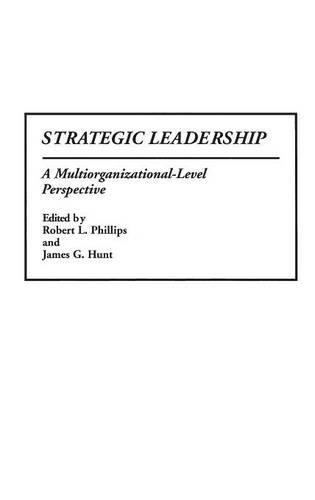
Strategic Leadership: A Multiorganizational-Level Perspective
(Hardback)
Publishing Details
Strategic Leadership: A Multiorganizational-Level Perspective
By (Author) Robert L. Phillips
Edited by James G. Hunt
Bloomsbury Publishing PLC
Praeger Publishers Inc
4th December 1992
United States
Classifications
Tertiary Education
Non Fiction
658.4012
Physical Properties
Hardback
352
Description
How useful are leadership studies to organizations trying to survive in today's increasingly changing environments and international competition The answer to this rhetorical question is very useful, provided the studies move beyond the lower-level face-to-face work that comprises more than 90% of that conducted. This movement beyond provides the book's focus on strategic leadership, a crucially important area that looks at those individuals or teams with overall responsibility for the organization. As a key part of that thrust, the book emphasizes the cascading direct and indirect strategic leadership effects at various organizational levels. That is, it considers the impact of strategic leader tasks such as mission, goal, strategy setting and organizational design on the organization. This work considers other aspects including external environment, cognitive capacity, transformational and visionary leadership, culture and climate, and a number of aspects of organizational change. These areas are examined by a number of authors specializing in leadership, organization and strategy. Overall, the intent is to firmly embed leadership within organizations and to examine this in terms relevant to the organizational restructuring and related concerns of the 90's. This book is directed primarily toward scholars, advanced students, and sophisticated practitioners with management, organizational behavior, organization theory, strategic management, public administration, or educational administration backgrounds.
Reviews
The collection of chapters presented provides a general overview of SST and a number of provocative ideas and interesting pieces of information concerning top-level leadership. The editors do a good job of summarizing each chapter and tying them together in the introductory chapter. The book should provide interesting reading for researchers in strategic management and perhaps for top-level managers with interests in the more theoretical or abstract nature of strategic management.-Contemporary Psychology
"The collection of chapters presented provides a general overview of SST and a number of provocative ideas and interesting pieces of information concerning top-level leadership. The editors do a good job of summarizing each chapter and tying them together in the introductory chapter. The book should provide interesting reading for researchers in strategic management and perhaps for top-level managers with interests in the more theoretical or abstract nature of strategic management."-Contemporary Psychology
Author Bio
ROBERT L. PHILLIPS is Associate Professor of Management and Associate Dean for Research and External Affairs, College of Business Administration, Texas Tech University. He is also Director of the Institute for Management and Leadership Research and is currently involved in research on leadership at the strategic level for Army organizations. JAMES G. (JERRY) HUNT is Paul Whitfield Horn Professor of Management, Professor of Health Organization Management, director of Program in Leadership, Institute for Management and Leadership Research and former Department Chair of Management, Texas Tech University. He has presented or had published more than 100 articles, papers and book chapters.
